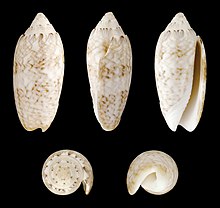Lettered olive
| Lettered olive | |
|---|---|

| |
| Scientific classification | |
| Domain: | Eukaryota |
| Kingdom: | Animalia |
| Phylum: | Mollusca |
| Class: | Gastropoda |
| Subclass: | Caenogastropoda |
| Order: | Neogastropoda |
| Family: | Olividae |
| Genus: | Oliva |
| Species: | O. sayana
|
| Binomial name | |
| Oliva sayana Ravenel, 1834
| |
| Synonyms[1][2] | |
| |
The lettered olive, Oliva sayana, is a
Subspecies
As of April 2010[update], the lettered olive contains the following accepted subspecies:[5]
- Oliva sayana sarasotensis Petuch & Sargent, 1986
- Oliva sayana sayana Ravenel, 1834
- Oliva sayana texana Petuch & Sargent, 1986
Distribution
The species' range is from
]Habitat
The lettered olive typically lives in near-shore waters, on shallow sand flats near inlets. The empty shell is occasionally, or sometimes commonly, washed up onto ocean beaches.[citation needed]



Shell description
The
The shell coloration can vary from cream to a greyish exterior with reddish-brown zigzag markings. The common name of this species is derived from the darker surface markings that sometimes resemble letters.
Life habits
Like all olives, the lettered olive is a
Its presence is sometimes detected at very low tides by the trails it leaves when it crawls below the surface on semi-exposed sand flats.[7]
Females lay floating, round egg capsules that are often found in beach drift. Young are free swimming.[7]
Human use
Colonists and early Native Americans made jewelry from these shells.[7]
The lettered olive is the state shell of South Carolina.[7]
References
- ^ Bieler R, Bouchet P, Gofas S, Marshall B, Rosenberg G, La Perna R, Neubauer TA, Sartori AF, Schneider S, Vos C, ter Poorten JJ, Taylor J, Dijkstra H, Finn J, Bank R, Neubert E, Moretzsohn F, Faber M, Houart R, Picton B, Garcia-Alvarez O, eds. (2018). "Americoliva sayana (Ravenel, 1834)". MolluscaBase. World Register of Marine Species. Retrieved 28 November 2018.
- ^ a b c Malacolog 4.1.1: Western Atlantic Mollusk Species Database. Retrieved April 2010.
- ^ Hardy, Eddie. "Oliva (Americoliva) sayana". www.gastropods.com. Retrieved 28 November 2018.
- ^ MolluscaBase eds. (2021). MolluscaBase. Oliva sayana Ravenel, 1834. Accessed through: World Register of Marine Species at: http://www.marinespecies.org/aphia.php?p=taxdetails&id=208387 on 2021-11-02
- ^ Oliva sayana Ravenel, 1834. Retrieved through: World Register of Marine Species on 26 April 2010.
- ^ "Observations of Americolivia sayana, Research Grade". iNaturalist.org. Retrieved 28 November 2018.
- ^ a b c d e Lettered Olive, NC Sea Grant
- Petuch E.J. & Sargent D.M. (1986). Atlas of the living olive shells of the world. xv + 253 pp., 39 pls.
- Petuch E.J. (1988). Neogene history of tropical American mollusks. Charlottesville, Virginia: The Coastal Education and Research Foundation. 217 pp., 23 figs + unnumbered figs, 39 pls.
- Rosenberg, G.; Moretzsohn, F.; García, E. F. (2009). Gastropoda (Mollusca) of the Gulf of Mexico, Pp. 579–699 in: Felder, D.L. and D.K. Camp (eds.), Gulf of Mexico–Origins, Waters, and Biota. Texas A&M Press, College Station, Texas.
